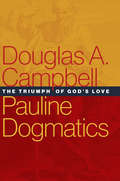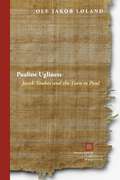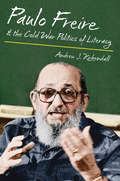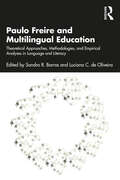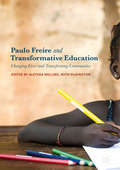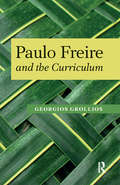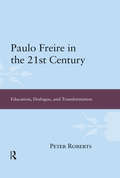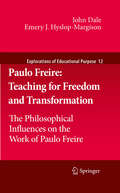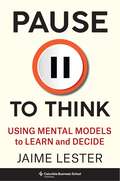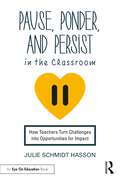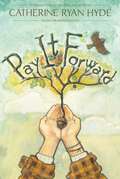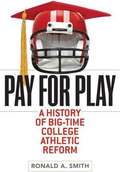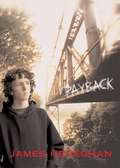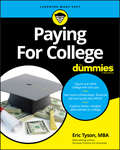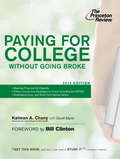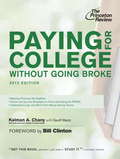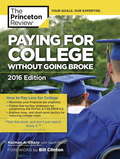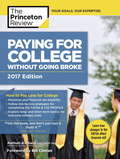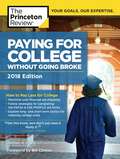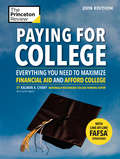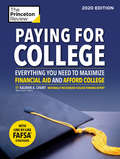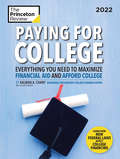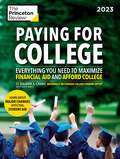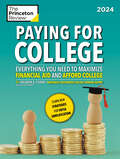- Table View
- List View
Paulette in Space
by Joan Fleiss Kaplan"These appealing decodable stories nurture early literacy development, which translates into building new readers' self-confidence. This, in turn, quickens the pace at which genuine reading comprehension is achieved ..."--Epsbooks.com.
Pauline Dogmatics: The Triumph of God's Love
by Douglas A. CampbellThe eschatological heart of Paul&’s gospel in his world and its implications for todayDrawing upon thirty years of intense study and reflection on Paul, Douglas Campbell offers a distinctive overview of the apostle&’s thinking that builds on Albert Schweitzer&’s classic emphasis on the importance for Paul of the resurrection. But Campbell—learning here from Karl Barth—traces through the implications of Christ for Paul&’s thinking about every other theological topic, from revelation and the resurrection through the nature of the church and mission. As he does so, the conversation broadens to include Stanley Hauerwas in relation to Christian formation, and thinkers like Willie Jennings to engage post-colonial concerns. But the result of this extensive conversation is a work that, in addition to providing a description of Paul&’s theology, also equips readers with what amounts to a Pauline manual for church planting. Good Pauline theology is good practical theology, ecclesiology, and missiology, which is to say, Paul&’s theology belongs to the church and, properly understood, causes the church to flourish. In these conversations Campbell pushes through interdisciplinary boundaries to explicate different aspects of Pauline community with notions like network theory and restorative justice.The book concludes by moving to applications of Paul in the modern period to painful questions concerning gender, sexual activity, and Jewish inclusion, offering Pauline navigations that are orthodox, inclusive, and highly constructive. Beginning with the God revealed in Jesus, and in a sense with ourselves, Campbell progresses through Pauline ethics and eschatology, concluding that the challenge for the church is not only to learn about Paul but to follow Jesus as he did.
Pauline Ugliness: Jacob Taubes and the Turn to Paul (Perspectives in Continental Philosophy)
by Ole Jakob LølandIn recent decades Giorgio Agamben, Alain Badiou, and Slavoj Žižek have shown the centrality of Paul to western political and philosophical thought and made the Apostle a central figure in left-wing discourses far removed from traditional theological circles. Yet the recovery of Paul beyond Christian theology owes a great deal to the writings of the Jewish rabbi and philosopher Jacob Taubes (1923–1987). Pauline Ugliness shows how Paul became an effective tool for Taubes to position himself within European philosophical debates of the twentieth century. Drawing on Nietzsche’s polemical readings of the ancient apostle as well as Freud’s psychoanalysis, Taubes developed an imaginative and distinct account of political theology in confrontations with Carl Schmitt, Theodor Adorno, Hans Blumenberg, and others. In a powerful reconsideration of the apostle, Taubes contested the conventional understanding of Paul as the first Christian who broke definitively with Judaism and drained Christianity of its political potential. As a Jewish rabbi steeped in a philosophical tradition marked by European Christianity, Taubes was, on the contrary, able to emphasize Paul’s Jewishness as well as the political explosiveness of his revolutionary doctrine of the cross.This book establishes Taubes’s account of Paul as a turning point in the development of political theology. Løland shows how Taubes identified the Pauline movement as the birth of a politics of ugliness, the invention of a revolutionary criticism of the ‘beautiful’ culture of the powerful that sides instead with the oppressed.
Paulo Freire & the Cold War Politics of Literacy
by Andrew J. KirkendallIn the twentieth century, illiteracy and its elimination were political issues important enough to figure in the fall of governments (as in Brazil in 1964), the building of nations (in newly independent African countries in the 1970s), and the construction of a revolutionary order (Nicaragua in 1980). This political biography of Paulo Freire (1921-97), who played a crucial role in shaping international literacy education, also presents a thoughtful examination of the volatile politics of literacy during the Cold War. A native of Brazil’s impoverished northeast, Freire developed adult literacy training techniques that involved consciousness-raising, encouraging peasants and newly urban peoples to see themselves as active citizens who could transform their own lives. Freire’s work for state and national government agencies in Brazil in the early 1960s eventually aroused the suspicion of the Brazilian military, as well as of U. S. government aid programs. Political pressures led to Freire's brief imprisonment, following the military coup of 1964, and then to more than a decade and a half in exile. During this period, Freire continued his work in Chile, Nicaragua, and postindependence African countries, as well as in Geneva with the World Council of Churches and in the United States at Harvard University. Andrew J. Kirkendall’s evenhanded appraisal of Freire’s pioneering life and work, which remains influential today, gives new perspectives on the history of the Cold War, the meanings of radicalism, and the evolution of the Left in Latin America. In the twentieth century, illiteracy and its elimination were political issues important enough to figure in the fall of governments (as in Brazil in 1964), the building of nations (in newly independent African countries in the 1970s), and the construction of a revolutionary order (Nicaragua in 1980). This political biography of Paulo Freire (1921-97), who played a crucial role in shaping international literacy education, also presents a thoughtful examination of the volatile politics of literacy during the Cold War. A native of Brazil’s impoverished northeast, Freire developed adult literacy training techniques that involved consciousness-raising, encouraging peasants and newly urban peoples to see themselves as active citizens who could transform their own lives. Freire’s work for state and national government agencies in Brazil in the early 1960s eventually aroused the suspicion of the Brazilian military, as well as of U. S. government aid programs. Political pressures led to Freire's brief imprisonment, following the military coup of 1964, and then to more than a decade and a half in exile. During this period, Freire continued his work in Chile, Nicaragua, and postindependence African countries, as well as in Geneva with the World Council of Churches and in the United States at Harvard University. Andrew J. Kirkendall’s evenhanded appraisal of Freire’s pioneering life and work, which remains influential today, gives new perspectives on the history of the Cold War, the meanings of radicalism, and the evolution of the Left in Latin America.
Paulo Freire and Multilingual Education: Theoretical Approaches, Methodologies, and Empirical Analyses in Language and Literacy
by Sandro R. BarrosThis collection celebrates the work of Paulo Freire by assembling transnational perspectives on Freirean-based educational models that reconsider and reimagine language and literacy instruction, especially for multilingual learners. Offering an international and comparative overview of Freire’s theories and critical pedagogies in relation to multilingualism, this volume presents innovative analyses and applications of theories and methods and features case studies in public schools, after-school and community literacy programs, and grassroots activism. Part I features chapters that expand on Freire’s concepts and ideas, including critical literacies, critical consciousness, and liberatory teaching principles. Part II features chapters that discuss empirical analyses from applied research studies that draw from these philosophical concepts, making important connections to key topics on supporting students, curriculum development, and teaching. Ideal for students and scholars in language education, bilingual/multilingual methods, and sociology of education, the volume informs teacher knowledge and practice. In offering alternative paradigms to our dominant, homogenized monolingual status quo, the chapters present a shared vision of what multilingual literacy can offer students and how it can transform educational spaces into sites of imagination, creativity, and hope.
Paulo Freire and Transformative Education: Changing Lives And Transforming Communities
by Alethea Melling Ruth PilkingtonThis book brings together a range of global and local themes inspired by the work of Paulo Freire. Freire believed in the possibility of change, rejecting the neoliberal discourse that presents poverty as inevitable: his core principle emphasised the prerogative of transforming the world, rather than adapting to an unethical world order. This responsibility to intervene in reality as educators is explored in detail in this edited collection. Including such diverse themes as pedagogical approaches to globalisation, social mobility, empowerment and valuing diversity within communities, the volume is highly relevant to pedagogical practice. Sharing the transformative power of ‘being’ through popular education and the solidarity economy, this innovative book will be of interest to scholars of Paulo Freire, transformative education and diversity in education.
Paulo Freire and the Curriculum (Series in Critical Narrative)
by Henry A. Giroux Donaldo Macedo Georgios Grollios Panayota GounariHow can Paulo Freire s progressive and vital contributions to curriculum planning can be made more relevant today for educators, policy makers and anybody involved in education? This book provides a necessary framework as it articulates significant questions. The first deals with Freire s positions on curriculum planning, the second is devoted to the historical development and the character of his perspective on curriculum planning, and the third refers to the ways his perspective compares to others, as well as to its contemporary value. Freire s perspective comes into direct conflict with traditional views on curriculum planning, the content of which represents what is perceived as the highest expression of Western civilization. Freire also breaks with the dominant perspective of social efficiency on curriculum planning whose main aim is to supply, via behavioral objectives, the knowledge and skills deemed necessary for the efficient function of the economy and the society, treats learners as passive receivers of knowledge, and assigns to curriculum a technical character disarticulated from social, political or ideological conflicts. In addition, he does not focus on studying the learner in an abstract or a-historical framework, nor does he adopt an individualistic interpretation which fetishizes spontaneity. In contrast to traditional perspectives on the curriculum, Freire provides a fertile ground for teachers and any others who seek to transform schools and improve student s learning and lives."
Paulo Freire in the 21st Century: Education, Dialogue, and Transformation (Interventions: Education, Philosophy, And Culture Ser.)
by Peter RobertsThis book explores the implications of world renowned educationalist Paulo Freire's theories for educational practice and how his ideas can help in bridging different genres and traditions. It addresses themes, questions and issues that have received little attention to date, including Freire's conception of the critical intellectual, the problem of defining literacy, and the possibility of a Freirean response to debates over political correctness. Roberts also relates Freire's ideas to those of other writers: Israel Scheffler, Fyodor Dostoevsky and Hermann Hesse, among others. Paulo Freire in the 21st Century makes a distinctive contribution to the international literature on Freire's work.
Paulo Freire: Teaching for Freedom and Transformation
by John Dale Emery J. Hyslop-MargisonThe primary mission of this text is clarifying many of the misconceptions about Paulo Freire's theories, concepts and his implications for education. It revisits his ideas and explains more fully the philosophical influences that shaped concepts such as problem posing, conscientization and praxis. The fundamental thesis, then, is that the present absence of in-depth philosophical analysis leaves an unacceptable void in the literature addressing Freire's work, while also promoting frequent misconceptions and superficial understandings about his relationship to contemporary education. Indeed, the philosophical assumptions contributing to Freire's critical pedagogy require identification, unravelling and ultimately evaluation on the basis of their epistemic and moral tenability. Most existing applications of Freire's pedagogy are unfortunately superficial because they simply sloganize terms such as banking education, conscientization, praxis, and humanization. A slogan in education popularizes a concept or idea in a positive way, but offers very little in terms of critical reflection or analysis. In order to understand these terms and their origin and apply them as Freire intended, a far richer and more in depth examination of Freire is desperately needed. This text will provide precisely that type of examination.
Pause to Think: Using Mental Models to Learn and Decide (Heilbrunn Center for Graham & Dodd Investing Series)
by Jaime LesterOur brains are wonderful tools, but they are nonetheless prone to misjudging information and making suboptimal decisions. In many situations, we act without fully considering why we are behaving in a certain way. We like to feel good about ourselves; we interpret the world using stories instead of statistics; and we make instinctive judgments and then stick to them. How can we think more clearly and make better decisions—in business and in life?This book is a practical and accessible introduction to mental models, teaching readers how to harness their power to think more clearly, make better decisions, and learn more effectively. The essential step in applying these concepts and frameworks, Jaime Lester shows, is to pause. Take a moment to reflect on the options, decide on the optimal approach before launching into action, and reexamine the process regularly. Drawing on a variety of academic disciplines as well as cognitive and behavioral research, Lester offers step-by-step templates to improve readers’ critical thinking and decision making. He guides readers through honing their reasoning in areas including finance, economics, statistics, and daily life and draws broader lessons for cultivating a prudent investment approach as well as personal well-being and happiness. Written in a conversational and witty style and featuring memorable examples and illustrations, Pause to Think shares essential lessons and tools for all readers interested in the power of mental models.
Pause, Ponder, and Persist in the Classroom: How Teachers Turn Challenges into Opportunities for Impact
by Julie Schmidt HassonHow can educators find joy in the midst of seemingly overwhelming challenges? Researcher Julie Schmidt Hasson interviewed hundreds of people about their most impactful teachers and shares her findings in this unique and powerful book. She lays out a three-step process that leads to greater peace, and greater impact on students. This three-step framework involves pausing, pondering, and persisting. First, teachers pause before reacting to an unexpected challenge, so they can intentionally choose a response. Next, they suspend assumptions and approach the challenge from a place of curiosity. Finally, they persist in this dance of patient inquiry and thoughtful responses in a way that leads to better outcomes for students. The stories integrated throughout the book provide evidence of the many ways teachers make a difference in students’ lives. It is a challenging time to be a teacher, and this book provides the inspiration and information teachers need to stay longer, grow stronger, and continue making an impact.
Pay It Forward: Young Readers Edition
by Catherine Ryan HydeThe internationally bestselling book that inspired the Pay It Forward movement is now available in a middle grade edition.Pay It Forward is a moving, uplifting novel about Trevor McKinney, a twelve-year-old boy in a small California town who accepts his teacher’s challenge to earn extra credit by coming up with a plan to change the world. Trevor’s idea is simple: do a good deed for three people, and instead of asking them to return the favor, ask them to “pay it forward” to three others who need help. He envisions a vast movement of kindness and goodwill spreading across the world, and in this “quiet, steady masterpiece with an incandescent ending” (Kirkus Reviews), Trevor’s actions change his community forever. This middle grade edition of Pay It Forward is extensively revised, making it an appropriate and invaluable complement to lesson plans and an ideal pick for book clubs, classroom use, and summer reading. Includes an author'snote and curriculum guide.
Pay for Play: A History of Big-Time College Athletic Reform (Sport and Society)
by Ronald A. SmithIn an era when college football coaches frequently command higher salaries than university presidents, many call for reform to restore the balance between amateur athletics and the educational mission of schools. This book traces attempts at college athletics reform from 1855 through the early twenty-first century while analyzing the different roles played by students, faculty, conferences, university presidents, the NCAA, legislatures, and the Supreme Court. Pay for Play: A History of Big-Time College Athletic Reform also tackles critically important questions about eligibility, compensation, recruiting, sponsorship, and rules enforcement. Discussing reasons for reform--to combat corruption, to level the playing field, and to make sports more accessible to minorities and women--Ronald A. Smith candidly explains why attempts at change have often failed. Of interest to historians, athletic reformers, college administrators, NCAA officials, and sports journalists, this thoughtful book considers the difficulty in balancing the principles of amateurism with the need to draw income from sporting events.
Payback
by James HeneghanThirteen-year-old Charley Callaghan is coping with some difficult changes in his life. His family has recently moved to Vancouver from Ireland, and his mother has died of cancer. Now he is desperately trying to fit in--in a new school, a new city, a new country--while holding a part-time job and keeping an eye on his little sister, Annie. Charley's red hair and Irish accent at first make him a target of the class bullies, but he is tough enough--just--to keep them at bay. So it is almost a relief to him when the bullies find a new target, Benny Mason. As the bullying intensifies, Charley keeps hoping that Benny will defend himself, but he fails to intervene. When the situation turns tragic, Charley must face some difficult questions about his own part in events. His search for atonement leads to an unusual friendship, and an unexpected opportunity to pay back. This gripping and thought-provoking novel is told with wit and empathy, by a masterful storyteller.
Paying For College For Dummies
by Eric TysonDiscover a concrete financial plan to finance a college education Financing a college education is a daunting task no matter what your circumstances. Bestselling author and personal finance expert, Eric Tyson offers tried and true strategic advice on how to understand loans, know your options, and how to improve your financial fitness while paying down your student loan debt. Armed with the checklists and timelines, you’ll be able to: Figure out what colleges actually cost Get to know the FAFSA® and CSS Profile(TM) Research scholarship opportunities Quickly compare financial aid offers from different schools Find creative ways to lighten your debt load Explore alternatives such as apprenticeships, online programs Paying for College For Dummies helps parents and independent students navigate everything from planning strategically as a married/separated/divorced/widowed parent, completing every question on the FAFSA and CSS PROFILE forms, understanding tax laws, and so much more. No other book offers this much practical guidance on choosing and paying or college.
Paying for College Without Going Broke, 2012 Edition
by Bill Clinton Princeton Review Kalman ChanyAs seen in USA TODAY, the Wall Street Journal, Money, and the Los Angeles Times, Paying for College Without Going Broke will help you: * Calculate the actual costs of college * Increase your chances of receiving aid * Compare aid offers and learn how to appeal if needed * Plan strategically as an independent student or divorced or single parent * Avoid costly mistakes when applying Paying for College Without Going Broke includes a foreword by Bill Clinton, as well as in-depth line-by-line strategies for filling out 2012-2013 aid forms, including the required federal FAFSA form.
Paying for College Without Going Broke, 2013 Edition
by The Princeton ReviewThe only annual college financial aid guide with line-by-line instructions for completing the FAFSA and CSS PROFILE aid forms! As seen in USA TODAY, the Wall Street Journal, Money, and the Los Angeles Times, Paying for College Without Going Broke will help you: • Calculate the actual costs of college • Increase your chances of receiving aid • Compare aid offers and learn how to appeal if needed • Plan strategically as an independent student or divorced or single parent • Avoid costly mistakes when applying Paying for College Without Going Broke includes a foreword by Bill Clinton, as well as in-depth line-by-line strategies for filling out 2013-2014 aid forms, including the required federal FAFSA form.
Paying for College Without Going Broke, 2014 Edition
by Princeton Review Kalman ChanyThe only annual college financial aid guide with line-by-line instructions for completing the FAFSA and CSS PROFILE aid forms!As seen in USA TODAY, the Wall Street Journal, Money, and the Los Angeles Times, Paying for College Without Going Broke will help you: * Calculate the actual costs of college * Increase your chances of receiving aid * Compare aid offers and learn how to appeal if needed * Plan strategically as an independent student or divorced or single parent * Understand long- and short-term money-saving tactics * Avoid costly mistakes when applying Paying for College Without Going Broke includes a foreword by Bill Clinton, as well as in-depth line-by-line strategies for filling out 2014-2015 aid forms, including the required federal FAFSA form. The eBook version of this popular guide includes links to downloadable PDFs of the sample forms and worksheets that appear in the book so that you can print them for reference, if desired. (Sample forms and worksheets can be printed directly from devices that support direct printing, or via the desktop app version of your device.)
Paying for College Without Going Broke, 2017 Edition: How to Pay Less for College
by Princeton Review Kalman ChanyThe only annual college financial aid guide with line-by-line instructions for completing the FAFSA and CSS PROFILE aid forms!As seen in USA Today, the Wall Street Journal, Money, and the Los Angeles Times, Paying for College Without Going Broke will help you: * Navigate the recent changes to the FAFSA* Use line-by-line strategies for filling out the FAFSA and CSS PROFILE to maximum effect* Increase your chances of receiving aid * Compare aid offers and learn how to appeal if needed * Calculate the actual costs of college * Plan strategically as an independent student or a divorced or single parent * Avoid costly mistakes when applying Paying for College Without Going Broke includes a foreword by Bill Clinton as well as in-depth line-by-line strategies for filling out 2017-2018 aid forms, including the required federal FAFSA form.Praise for PAYING FOR COLLEGE WITHOUT GOING BROKE:"Get this book, and don't just read it. Study it." --Chicago Tribune"Can save thousands in college bills." --John Wasik, Forbes"A first-rate guide through the financial aid maze." --Lynn Brenner, Newsday"...Kalman Chany's Paying For College Without Going Broke [is] a must-read now. It's loaded with tips that can save you thousands on college bills...when I got to the section on financial aid, my eyes lit up." --John Wasik, Forbes.com"One of my favorite financial-advice books." --Eric Tyson, author of Investing for Dummies and Personal Finance for Dummies
Paying for College Without Going Broke, 2018 Edition: How to Pay Less for College
by Princeton Review Kalman ChanyTake control of your college financial aid experience with this essential guide—the only annual guidebook with line-by-line instructions for completing the FAFSA and CSS PROFILE aid forms!The filing date for the FAFSA has moved up—and since many colleges disburse financial aid on a first-come, first-served basis, it's essential that you get your paperwork filled quickly and accurately. As seen in USA Today, the Wall Street Journal, Money, and the Los Angeles Times, Paying for College Without Going Broke will help you do just that, plus ... • Navigate the most recent changes to the FAFSA• Use line-by-line strategies for filling out the FAFSA and CSS PROFILE to maximum effect• Calculate the actual costs of college • Increase your chances of receiving aid • Avoid costly mistakes when applying for assistance• Compare aid offers and learn how to appeal if necessary • Plan strategically as a separated/divorced parent, blended family, or independent studentPaying for College Without Going Broke also includes a foreword by former president Bill Clinton.
Paying for College, 2019 Edition: Everything You Need to Maximize Financial Aid and Afford College (College Admissions Guides)
by Princeton Review Kalman ChanyPaying for College: Everything You Need to Maximize Financial Aid and Afford College is the ONLY annual college financial aid guide with line-by-line instructions for completing the FAFSA and CSS Profile aid forms!Featured in USA Today, the WSJ, Money, the Los Angeles Times, the Washington Post, and dozens more, Paying for College helps students and their families maximize financial aid eligibility. Packed with specific information, it guides parents and students with info on: * How to fill out all those forms (FAFSA, CSS Profile, etc.) to your advantage! * How to understand the financial aid (FA) process and pick a college with FA in mind * How to navigate recent changes to FAFSA legislation * How to evaluate an aid offer and negotiate with the FA office * Long-term strategies (bonds, trusts, Coverdell ESAs, 529 plans, etc.) * Short-term strategies (taxes, real estate assets & liabilities, the impact of debt on an FA application)... and more!
Paying for College, 2020 Edition: Everything You Need to Maximize Financial Aid and Afford College (College Admissions Guides)
by The Princeton Review Kalman ChanyA SMARTER WAY TO PAY FOR COLLEGE. Take control of your financial aid experience with this essential guide—the only annual guidebook with line-by-line instructions for completing the FAFSA aid forms!Financing a college education is a daunting task no matter what your circumstances. With line-by-line instructions for filling out the FAFSA and consumer-friendly advice to minimize college costs, Paying for College helps you take control of your experience and:• Learn how the new tax law affects financing your college education• Maximize your financial aid eligibility• Explore long- and short-term strategies to reduce college costs and avoid expensive mistakes• Complete every question on the FAFSA and CSS Profile forms to your best advantage• Compare aid offers and learn how to appeal them if necessary • Plan strategically as a separated/divorced parent, blended family, or independent student
Paying for College, 2022: Everything You Need to Maximize Financial Aid and Afford College (College Admissions Guides)
by The Princeton Review Kalman ChanyA SMARTER WAY TO PAY FOR COLLEGE. Take control of your financial aid experience with this essential guide—the only annual guidebook with line-by-line instructions for completing the FAFSA aid forms!Financing a college education is a daunting task no matter what your circumstances. With line-by-line instructions for filling out the FAFSA and consumer-friendly advice to minimize college costs, Paying for College helps you take control of your experience and:• Maximize your financial aid eligibility• Learn how COVID-19 and the latest tax laws affect the financing of your college education• Explore long- and short-term strategies to reduce college costs and avoid expensive mistakes• Complete every question on the FAFSA and CSS Profile forms to your best advantage• Compare aid offers and learn how to appeal them if necessary • Plan strategically as a separated/divorced parent, blended family, or independent student&“A first-rate guide through the financial aid maze.&”—Lynn Brenner, Newsday&“Can save thousands in college bills.&”—John Wasik, Forbes
Paying for College, 2023: Everything You Need to Maximize Financial Aid and Afford College (College Admissions Guides)
by The Princeton Review Kalman ChanyA SMARTER WAY TO PAY FOR COLLEGE. Take control of your financial aid experience with this essential guide—the only annual guidebook with line-by-line instructions for completing the FAFSA aid forms! Financing a college education is a daunting task no matter your circumstances. With line-by-line instructions for filling out the FAFSA and consumer-friendly advice to minimize college costs, Paying for College helps you take control of your experience and: • Maximize your financial aid eligibility • Start preparing now for upcoming changes affecting student aid • Explore long- and short-term strategies to reduce college costs and avoid expensive mistakes • Complete every question on the FAFSA and CSS Profile aid applications to your best advantage • Compare aid offers and learn how to appeal them if necessary • Plan strategically as a separated/divorced parent, blended family, or independent student &“A first-rate guide through the financial aid maze.&” —Lynn Brenner, Newsday &“Can save thousands in college bills.&” —John Wasik, Forbes
Paying for College, 2024: Everything You Need to Maximize Financial Aid and Afford College (College Admissions Guides)
by The Princeton Review Kalman Chany Geoffrey MartzA SMARTER WAY TO PAY FOR COLLEGE. Take control of your financial aid experience with this essential guide—the only annual guidebook with line-by-line instructions for completing the FAFSA aid forms!Financing a college education is a daunting task no matter your circumstances. With line-by-line instructions for filling out the FAFSA and consumer-friendly advice to minimize college costs, Paying for College helps you take control of your experience and:• Maximize your financial aid eligibility• Start preparing now for upcoming changes affecting student aid• Explore long- and short-term strategies to reduce college costs and avoid expensive mistakes• Complete every question on the FAFSA and CSS Profile aid applications to your best advantage• Compare aid offers and learn how to appeal them if necessary • Plan strategically as a separated/divorced parent, blended family, or independent student&“A first-rate guide through the financial aid maze.&” —Lynn Brenner, Newsday&“Can save thousands in college bills.&” —John Wasik, Forbes

